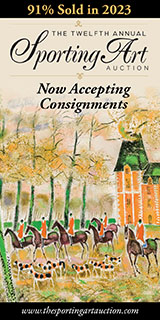The still-fresh images of American Pharoah’s victorious jockey Victor Espinoza standing in his irons, fist in the air, cruising past the stands of cheering spectators, legs bobbling to absorb the shock of each footfall, provide a perfect segue into this article by Betsy Parker.
A jockey isn’t really an athlete, After all, the horse does all the work, right? / David Chapman photo
Overheard railside at the Foxfield Races near Charlottesville: One pastel-clad college kid to the next as they rummage for beer in their cooler before noon on Saturday: “Jockeys aren’t really athletes. They just sit in the saddle for a few minutes. I could do that!”
I almost fainted. Here the most provocative lede of the decade just dropped in my lap, and I couldn’t get to the jock’s room fast enough to dangle the mother of all conversation-starters like a tenderloin in front of a pack of hungry dogs. Hustling up the hill, I tried the assertion on jockeys Gerard Galligan and Brendan Brooks. They laughed.
“Anyone who’d say that has never ridden a race,” Galligan sniffed.
“Anyone who’d say that has never ridden a horse!” Brooks countered. “There’s so much more to racing than ‘riding.’”
As the Irishmen trailed off to walk the Barracks Road course, I jotted some interview questions. There was more to the story than laughing at a schoolboy’s boast. It’s not only athletic endeavor that drives competitiveness, as I’d soon find out. It’s part will to win, part boldness. Part athletic concentration, part love of sport. It’s a certain level of excitement tempered by highly-honed mental agility.
A 1980s University of North Carolina study measured that pound-for-pound, jockeys are the strongest, quickest, most agile and most hardcore athletes on the planet. Had the researchers studied jump jockeys, they’d’ve doubled it.
Seabiscuit author Laura Hillenbrand once described racing as “riding a half-ton catapult.” There are demands on coordination and reflex as the jockey hovers above the tiny racing saddle, no mere passenger. The role of bringing home winners is demanding, as the jockey pilots a living rocket ship sprinting up to forty miles an hour.
“It’s a lot harder than it looks,” Hall of Fame jockey Jerry Bailey told the Richmond Times-Dispatch. “Try acting like you’re sitting in a chair—without a chair—for two minutes.” [Make it four to play-act a hurdle race, or nine to pretend you’re riding the Gold Cup.
“Trust me,” said retired jockey and circuit starter Graham Alcock, “you’re not just sitting there.”
“Balance is key,” added Galligan, based out of The Plains. “You’re not ‘sitting’ at all. You’re above the [natural galloping] action.” Perched on your toes, or on the balls of your foot on inch-wide aluminum stirrups, “it takes tremendous strength,” added Millwood-based Brooks. Given that the closest most people have come to racing a horse is watching close-ups in the Kentucky Derby shots from “Secretariat,” it doesn’t surprise Brooks that some people have no clue. “If you haven’t done it, you can’t possibly know what we go through.”
Fitness, mindfulness, concentration
Jockey Keri Brion said she’s never been more fit than she is now, for riding races. Not even when she was a scholarship pole vaulter at college. “It’s an overall fitness. Quick-thinking and strong. Everything has to work together.”
Grand National timber stake winner and Foxcroft grad Annie Yeager agreed, stressing that though riding in general and racing even more so can be dangerous, fitness gives a layer of protection in addition to the certified helmets and Kevlar-like body vests jockeys are required to wear. “Overall fitness can keep you from getting hurt sometimes. I had a fall yesterday [at the 16th fence in the April 25 Maryland Hunt Cup] but here I am today, just fine. A little sore. Being fit helps.”
Foxfield course physician Dr. George Lindbeck recognizes an abiding “need for speed” that drives race riders right back to the saddle even after a alarming spill. “They’re a pretty stoic bunch,” he said. “If it’s not crooked, bleeding, or on fire, they tend to minimize injuries in order to keep riding.”
Trainer and retired jockey Doug Fout knows the feeling. He remembers a particularly nasty spill he took in 1983 at Foxfield. “The horse pretty much ran over my face,” he recalled. “I was lying there on the stretcher, hoping I could ride the next race. I told John Dale Thomas to take the rocks out of my mouth so I could talk. He got a closer look at me and said, ‘Man, those aren’t rocks. Those are your teeth.’”
Amateur jockey Fritz Boniface likens the driving force—win, lose, or fall—to the runner’s high. “It’s an addiction,” he said. “It’s the highest high you can get, a real adrenalin rush. It requires total focus. There’s a lot of camaraderie [in the jock’s room]. It’s a dangerous sport, and we’re all in it together.
“I think everybody gets a little nervous—maybe more excited than scared. Galloping down to a solid fence on an animal with a mind of its own? What do you think?”
All-time leading amateur Gregg Ryan believes controlling the mind is part of the jockey-athlete dichotomy. “A jockey has to be a strategic thinker,” he said. “You can win by riding the best race, not necessarily having the best horse. Like in football, your best players will always know where the first-down line is, the best wrestlers know how much time’s on the clock.
“A jockey needs to assess everything around him, fast, and predict. That’s the sports mind. You’re a couple steps ahead.”
Circuit patrol judge and retired jockey Jennifer Youngman linked jockey-athlete to jockey-thinker. “The jockey is the brains of the operation.”
Fout acknowledges mental aspects of the game, but stressed the pleasure and excitement generated by racing, and winning. “You do it for the thrill. It’s something you can never get out of your system. I’ve been retired for twenty years, but I still miss it,” he said. “I’ve ski raced, jumped out of helicopters, raced cars, and there’s nothing better than riding a good horse into the last fence and having a chance to win. You don’t do it for the money. You do it for the rush.”
“To me, there’s no question they’re athletes,” said Middleburg orthopedic surgeon Dr. Andrew Bishop. Bishop recognizes the mindset: he was team doc for the NFL’s Atlanta Falcons. “[Jockeys] have highly developed skills…and go through lots of training to get to that level.”
Bishop told Middleburg Life magazine he sees many similarities between riding and football. Still, there are unique differences. “A football player will say, ‘I’m hurt, when can I get back on the field?’ Horse people will say ‘I’m hurt, I’m [riding] tomorrow, and you have to figure out a way for me to do it.’ It’s not when or even if. They’re passionate.”
Posted June 7, 2015
Former jump jockey Betsy Parker knows her subject. She’s an award-winning photo/journalist now, who writes for the Fauquier Times, in which this article was originally published.


















